Creating A Post-Pandemic Caring Economy
An Interview With Riane Eisler, author of Nurturing Our Humanity and The Chalice and the Blade
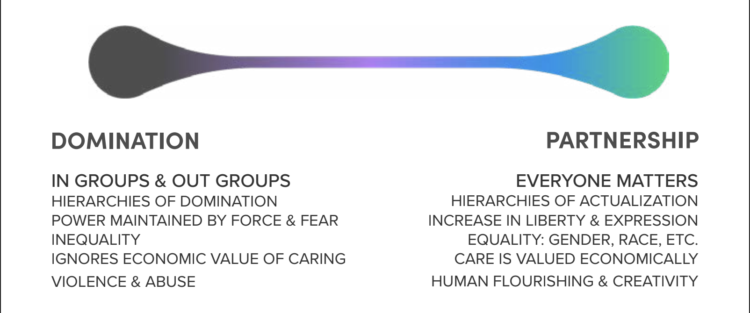
Listen to the Interview on SoundCloud or YouTube
“I’ve often spoken about domination systems as trauma factories starting in early childhood, but economics has a piece there too causing, as we see, enormous trauma. When you have a nation, a rich nation where a quarter of children live in poverty, many of them going to bed hungry every night, that’s not a normal we want to go back to. We must create a new Partnerism normal.”– Riane Eisler, Creating a Post-Pandemic Caring Economy, Kindred Interview
Adam Smith, Karl Marx… Now Riane Eisler
ABOUT THIS INTERVIEW
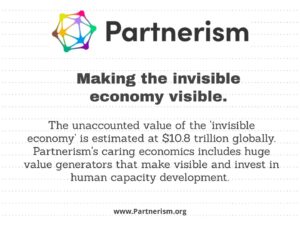
Thanks to 2020’s global pandemic and quarantine America’s barbaric lack of support for families, caregivers and children is finally being questioned in mainstream media outlets like The Atlantic’s What America Asks Of Working Parents Is Impossible. The Atlantic article’s artwork – a splintered, screaming head – perfectly illustrates our culture’s fragmented consciousness: an industrial worldview that does not honor the continuum of life, nor value its needs for a nurturing culture to create healthy human beings.
In 2019, a UNICEF study ranking 40 developed countries on family-friendly policies found the United States in last place. The indicators measured included paid leave available to mothers, paid leave reserved for fathers, childcare enrollment for kids under 3 years old, and childcare enrollment between age 3 and school age.
Only 14% of US civilian workers in 2016 had access to paid family leave in 2016, according to the Pew Research Center. One in four US mothers return to work 10 days after giving birth. And just over one-third of American mothers don’t return to work (pdf) after having a baby. (The economic losses of not having paid family leave are significant.)
The minimum paid leave available should be 6 months, according to a report published by The New America Foundation. Postpartum mothers face depression, fatigue, general pain and illness, and lactation issues including mastitis, childcare issues, and workplace lactation support, yet in the US, most mothers return to work two weeks after giving birth.
How do we heal the splintered mind and move into a worldview/consciousness that not only perceives wholeness, but is capable of embodying the life-affirming values necessary to create a Caring Economy? How do we make the whole system changes necessary to support human and all life on our planet? The current pandemic is moving us at lightening speed toward finally recognizing the death-worshipping values (competition, judgement, shaming) inherent in our Dominator Culture and motivating us to consider how we can create a Caring Economy, one based on human values of love, connection, and living in harmony with nature.
At Kindred, we’ve championed the Conscious Parenting Movement and its mission to resolve the Bio-Cultural Conflict since 1996. The Bio-Cultural Conflict is the choice parents must make between conforming to cultural imperatives in order to survive and meeting the biological imperatives for their children, and themselves, to create healthy humans. The United States ranks at the bottom of all developed nations for support for families and therefore, the health of its mothers, babies, and children.
After two decades of interviewing thought-leaders, this interview with Riane Eisler – a social systems scientist, human rights advocate, attorney, cultural historian, and Holocaust refugee – feels like summiting a formidable mountain whose expansive vista reveals a post-COVID sustainable path forward. Thirty years ago, Eisler’s seminal work, The Chalice and the Blade, showed us how we, as a species, left a path and narrative of peaceful beings five thousand years ago. The Dominator path, and the culture and systems this splintered worldview created, warped our neurobiology and being into an atypical species disconnected from itself, others, and its life-giving environment.
What does our intact, peace-loving neurobiology look like? Is it still accessible to us? In her book, Nurturing Our Humanity: How Domination and Partnership Shape Our Brains, Lives, and Future, Eisler explores our neurobiological and cultural hurtles to recovery.
As Eisler says in the interview below, “The Dominator Culture is a trauma factory.” In a hopeful observation, Eisler believes the many consciousness-raising movements of the past fifty years, including the Conscious Parenting Movement, aka the Child Liberation Movement, are results of our attempts to wake ourselves from the Dominator Trance. How do we wake ourselves up in time to heal ourselves, break cycles of violence, model peace for our children, and transform our world? We must become the seeds of the new Partnership Culture and Caring Economy by embodying those values, Eisler writes in Nurturing Our Humanity.
To describe this new worldview, we will need new language and narratives, Eisler tells us in the interview below. Hence, the word she created to describe the counter point to the Dominator Culture: Partnerism.
Partnerism is a social framework for organizing all relations around life-supporting values of mutual respect and responsibility, non-violence, equality, empowerment, and caring.
The values of a new Partnership Culture are based on Four Cornerstones of society:
– Family & Childhood
– Gender Socialization
– Economics & Values
– Stories We Tell/Words
These values are translated into Eisler’s Social Wealth Index, which measure the value of caring for people and the planet, a key indicator of cultural and economic wellness ignored by antiquated capitalist and communist models. The Social Wealth Index, developed by the Center for Partnership Studies, is a more accurate metric of economic health that documents the enormous economic value of the work of care (parenting, elder care, sick care, child care), its key role in a nation’s human capacity development (read: functional not traumatized and broken people), and what investments are needed for a better quality of life and a strong economy (read: paid family leave, childcare, maternal and infant health care, breast-feeding workplace support, and universal health care). When accurately accounted for, care emerges as both a prime mover of economic growth and a reliable indicator of a nation’s current and future social wellbeing and economic vitality.
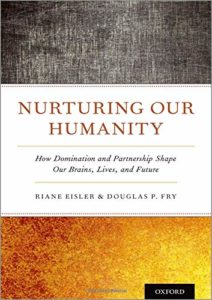
In her latest book, Nurturing Our Humanity, How Domination and Partnership Shape Our Brains, Lives and Future, the human value of love has never been woven into the social or economic systems that measure what we treasure. Why not? And how has the lack of the value of love in our systems contributed to our splintered consciousness?
“This devluation of love as ‘feminine’ also lies behind the fact that until recently scientists paid hardly any attention to the study of love. Even the new breed of systems scientists who began to emerge during the second part of the 20th century failed to include matters pertaining to the female half of our species in their supposedly inclusive analyses of social systems. This constriction, distortion, and fragmentation of consciousness, based on the denial that women or topics pertaining wo women are important, has been an obstacle to a true systems science.” – Nurturing Our Humanity, page 224.
The personal and systemic resolution of the Bio-Cultural Conflict is a discussion we’ve been exploring at Kindred for decades, and the driving force behind the Conscious Parenting Movement: our need to resolve the splintered consciousness that denies our capacity for peace and love, and instead engages in navel-gazing, dualistic thinking processes like, “Which came first? The chicken or the egg?”
In a whole human consciousness, the chicken and the egg are never separate as the chicken is in the egg and the egg is in the chicken. In our human world, the child is in the adult and the adult is in the child (we turn to Robin Grille’s Inner Child Journeys and ACES insights for help here). On Kindred, you can also read Darcia Narvaez’s award-winning research on the Evolved Nest – the early nurturing baselines for lifelong wellness. Narvaez’s posts explore restoring humanity’s promise and neurobiological recovery from the Dominator Culture’s legacy of trans-generational trauma, authoritarianism towards babies, toxic masculinity, fascism, racism, white supremacy, and environmental degradation.
And finally, at Kindred we are currently discussing ways to befriend the Activist’s Paradox – as the seeds of the new Partnership Culture and Caring Economy are found within our bone-deep wisdom, intuition, earth connection, and love for one another. As David Metler, Kindred’s social justice editor, shares in his essay, conscious activism involves recognizing the value and need for relational activism, daily nurturing of ourselves, each other, and our planet. Traditional activism will be needed in the months and years ahead, but a sustainable path to creating the Caring Economy Riane Eisler presents below will require that we heal ourselves, embody these nurturing values, and then carry our recovered humanity into the Dominator Culture’s faltering policymaking, institutional, and economic realms.
We are the seeds of the emerging culture, whether we are conscious of this reality, or not. Let’s support each other in creating a world – a Caring Economy – that supports all life. Please join us over at Eisler’s Center for Partnership Studies and the new Partnerism website this year as they launch many new educational programs, toolkits, and summits that will help us organize and focus our collective energies.
We are the New Story.
Resources
Please find the transcript from the interview below.
Center for Partnership Studies
More Kindred stories related to this topic:
The Roots Of Pathology: Authoritarianism Towards Babies
The Evolved Nest Initiative. The Evolved Nest promotes optimal health and wellbeing, cooperation, and receptive and sociomoral intelligences. Societal moves away from providing the Evolved Nest have contributed to the ill being and dysregulation we see in one another and society. Learn how to nest your children and re-nest yourself.
About Riane Eisler

Riane Eisler is a social systems scientist, cultural historian, and attorney whose research, writing, and speaking has transformed the lives of people worldwide. Her newest work, Nurturing Our Humanity: How Domination and Partnership Shape Our Brains, Lives, and Future, co-authored with anthropologist Douglas Fry and coming out with Oxford University Press in July 2019, shows how to construct a more equitable, sustainable, and less violent world based on partnership rather than domination.
Dr. Eisler is president of the Center for Partnership Studies (CPS), dedicated to research and education, Editor-in-Chief of the Interdisciplinary Journal of Partnership Studies, an online peer-reviewed journal at the University of Minnesota that was inspired by her work, keynotes conferences nationally and internationally, has addressed the United Nations General Assembly, the U.S. Department of State, and Congressional briefings, and has spoken at corporations and universities worldwide on applications of the partnership model introduced in her work.
She is internationally known for her bestseller The Chalice and The Blade: Our History, Our Future, now in 27 foreign editions and 57 U.S. printings. Her book on economics, The Real Wealth of Nations: Creating a Caring Economics, was hailed by Archbishop Desmond Tutu as “a template for the better world we have been so urgently seeking” and by Jane Goodall as “a call to action.” Her Transforming Interprofessional Partnerships, co-authored with Teddie Potter, won national and international awards, and her Equal Rights Handbook was the only mass paperback on the Equal Rights Amendment.
She is the only woman among 20 major thinkers including Hegel, Adam Smith, Marx, and Toynbee in Macrohistory and Macrohistorians in recognition of the lasting importance of her work as a cultural historian and evolutionary theorist. She has received many honors, including honorary PhDs, the Nuclear Age Peace Leadership Award, the Feminist Pioneer award, and inclusion in the award-winning book Great Peacemakers as one of twenty leaders for world peace, along with Mahatma Gandhi, Mother Teresa, and Martin Luther King.
Listen to the interview here and read the transcript below
INTERVIEW SECTIONS (Click to skip to that section)
Our Economy Does Not Reflect Our Values – DOW and GDP Disconnected From Humanity
The Antiquated, Gender-Biased, Erroneous Story of Capitalism vs. Socialism
New Language for a New Narrative and a New Story
The Neuroscience Of Oppression and Awakening from the Dominator Trance
Domination Systems Are Trauma Factories
Partnerism and the Post-Pandemic Economy
Creating A Post-Pandemic Caring Economy
INTERVIEW TRANSCRIPT
LISA: Welcome to Kindred. This is Lisa Reagan and today we will hear from Riane Eisler on creating a post-pandemic caring economy and culture. Riane is a social systems scientist, cultural historian, and attorney whose research, writing, and speaking has transformed the lives of people worldwide. Her newest work, Nurturing Our Humanity: How Domination and Partnership Shape Our Brains, Lives, and Future shows how to construct a more equitable, sustainable, and less violent world based on partnership rather than domination. Riane is internationally known for her best seller and Seminole work, The Chalice and the Blade, Our History Our Future, which Ashley Montague called “the most important book since Darwin’s Origin of Species.” Currently Riane is president of the Center for Partnership Studies which is dedicated to research and education.
So, welcome Riane.
RIANE: It’s a pleasure to be with you, Lisa.
LISA: We have a little roadmap here that we’re going to try to follow in the next 45 minutes to help Kindred followers understand your work and its incredible importance, especially right now as we are considering the post-pandemic economy and what is going to happen? I think I would just like to start there and where is it you see opportunities? How could we shift the economy that has not been a caring or a collaborative economy in that direction?
RIANE: I think that the COVID-19 pandemic has really exposed some structural faults in current economic systems. How, really, they’re not resilient, but what my work has done is to look at the underlying problems, because people tend to look at economics as if it just existed someplace in isolation from our value system, from our larger society. Of course, one of the things that we’ve seen is the “essential workers” are those in child care, health care, for keeping a clean environment, for providing us with food and other necessities. But we’ve also seen – and this is one of the real flaws in current economic systems – that this work is not adequately rewarded by our current systems. It has to be, and it really has to be as we shift from an industrial to a post-industrial society.
This is not only a human environmental issue, but it is also an issue of economic effectiveness because economists never tire of telling us that the most important capital for our new knowledge service era is what they like to call high-quality human capital. And, of course, we know from neuroscience that whether or not that capital is produced largely depends on care, on the quality of care, especially the quality of care that children receive early on. So, this pandemic – when the old normal seems to be crumbling all around us – is really our opportunity to build a new more sustainable, more humane, more environmentally adequate way of thinking of what is normal. Economics is a huge part of that.
Our Economy Does Not Reflect Our Values – DOW and GDP Disconnected From Humanity
LISA: There’s hardly a day that anyone can turn on a news show and right away they’re telling you what is the DOW doing? And everyone is really interested in that number, but as you’ve pointed out in your book, The Real Wealth of Nations, this is a part of the problem. Can you tell us about our GDP and why does that not work to measure what’s valuable in our country?
RIANE: All we have to really do is to look at the incredible disconnect between the skyrocketing, as we speak, U.S. stock market and what’s actually happening to people: unemployment is soaring. Homelessness is soaring. Evictions are soaring. Hunger is soaring. I mean, come on, to really measure the health of an economy by how the financial markets are doing, which is what a lot of GDP does, it’s crazy.
But the GDP is actually a crazy system because if you really look at it, GDP actually includes as positives activities that harm and take life. I like to give the example of selling cigarettes. Not only is that part of the GDP, but so are the resulting health costs, funeral costs. They all make the GDP go up. The same thing is true of fast foods, high fructose foods. I mean, of oil spills, you know the clean-up costs, the lawsuits; they’re great for GDP.
Not only does GDP put in negatives as positives, and this is really critical, it fails to include as productive work, the incredible economic value of what I call the three life-sustaining sectors: the household, the volunteer community economy, and the natural economy. Economists are still teaching in economic schools that parents who work from dawn to dusk in households are “economically inactive” because their work is not included in the GDP. It’s lunatic and we have to change it.
That’s why the Center for Partnership Studies developed what we call Social Wealth Economic Indicators, which we’re now working to update and condense into a one, because there’s 24 of the social wealth economic indicators, into one or two numbers so that really policy makers have a realistic guide for how they allocate investments. That is changing policies.
What Is The Social Wealth Index?
Unlike most proposed GDP alternatives, the Social Wealth Index (SWI) will measure the enormous return from caring for people and nature, as well as the huge costs of not doing so – not only in human and environmental terms but also in purely economic terms. It will demonstrate the economic value of care work, from childcare and eldercare to healthcare and environmental care, as well as of caring business and government policies.
Learn more about the Social Wealth Index at the Center for Partnership Studies.
The Antiquated, Gender-Biased, Erroneous Story of Capitalism vs. Socialism
LISA: Can you tell us a little bit about capitalism and socialism. It is presented in this country that you’re one or the other, and I know when I posted on Kindred recently my interview with Suzanne Zeedyk in Scotland, they have a lot of social safety nets in place like paid family leave and healthcare and maternal care that allow for them to put programs into place that support children, at risk especially, and they were able to lower violence, especially in big cities like Glasgow, by 50%. But in America, when I posted that article, people showed up on Facebook going, “You’re a communist! You’re a socialist.” So, can you help us?
RIANE: Well we have been told an erroneous story. If we look at these policies that they call communist or socialist, they’re really caring policies, aren’t they? You know, paid parental leave, paid sick leave, elder care with dignity, free and accessible high-quality early childhood education, these are policies informed by caring for people, and of course environmental protection is informed by caring for nature. What they fail to recognize is that neither socialist nor capitalist theory actually support caring policies.
Capitalism and socialism came out of the 1700s and 1800s, early industrial times. So on that count alone they would be outmoded in our 21st century post-industrial knowledge service economy. But the problem goes much deeper because both Smith, you know the father, so to speak, of capitalism and Marx, the father of so-called scientific socialism which later morphed into communism in the former Soviet Union and China, they came out of times when the work for caring for nature wasn’t on their horizon. For them, exploiting nature with unlimited growth was the model. As for the work of caring for people in households, you know childcare, caring for the sick, for the elderly in their time this “women’s work” was supposed to be performed for free by a woman in a male controlled household, so much so that even when in the 1800s when Marx wrote in most places even in the West a woman could not legally sue for injuries inflicted on her, only her husband could for loss of her services. Now that gender system of values was perpetuated by both capitalism and socialism, which classified the work of caring for people and caring for nature as just reproductive rather than productive, which is why we have such an incredibly insane way of measuring economic health. It comes out of both these theories.
It’s really nonsense to call these socialist or capitalist policies. And the fact of the matter is that the nations that actually pioneered caring policies, and we can talk a little bit about them, are not socialist. They often call themselves what they are: caring societies.
LISA: And who are those?
RIANE: Well, we’re talking primarily of northern European nations like Finland, like Norway, like Sweden, which really – at the beginning of the 20th century – was so poor that there were famines; whole American states like Minnesota were populated by people fleeing dire poverty. Today these nations are regularly not only in the highest ranks of the World Economic Forum’s Global Competitiveness Reports, but they’re also in the highest ranks of the World Happiness Reports, and one of the major reasons is that they pioneer caring policies.
This did not happen in a vacuum and this is really why we have to heed what Einstein said, which is that we can’t solve problems with the same old thinking that created them, namely capitalism versus communism or socialism versus capitalism. That we really have to have a different way of looking at the world, and for, as you know, for about 30 years now one book after another that I’ve written has reported findings of a very different underlying social classification that transcends old categories like right/left, religious/secular, Eastern/Western, capitalist/socialist, what I call a Domination System and a Partnership System. These nations have moved more to the partnership side, and in order to understand these classifications we really have to do something that old categories don’t: to no longer ignore or marginalize the majority of humanity, women and children because as these so-called soft feminine, caring policies, really depend to a large extent on the rising status of women.
These caring economy nations have moved more to the partnership side, and in order to understand these classifications we really have to do something that old categories of capitalism and communisim don’t: to no longer ignore or marginalize the majority of humanity, women and children because as these so-called soft feminine, caring policies, really depend to a large extent on the rising status of women.
RIANE EISLER
It’s not only that in these nations – the national legislatures are 40 to 50% female – it’s that as the status of women rises men no longer feel it’s such a threat to their status, to their so-called masculinity, to also embrace more caring policies. In other words, the movement towards more fluid gender stereotypes, and the movement towards empowering women is not a movement of women against men or men against women, it’s a movement to really free both women and men from the straightjackets of old gender stereotypes, and yes, to elevate policies that, in the old mindset that both Marx and Smith shared, are no longer considered soft or feminine caring policies.
New Language for a New Narrative and a New Story
LISA: A few years ago we stopped using the term “patriarchy” at Kindred because it was easy to see that that pitched some of the issues that we talked about in the man versus women camp, and those of us who were mothers of men said, “This isn’t going to work.” I’m talking about myself, and I have entered Cultural Transformation Theory and the Domination Culture into Kindred’s New Story Glossary and Lexicon, so when people are reading our stories and futures and we use the new language.
This is one of the Four Cornerstones of your work, Partnerism, we use new narratives and new language to tell a new story. We felt it very important to say Dominator or Domination System instead of patriarchy so we wouldn’t end up a hamster in a wheel going around and around with old terminology. So, thank you for that.
RIANE: Well, I think you’ve put it very well, Lisa. I want to say that you know linguistic psychologists have long told us something that we really need to heed, which is that the categories, which is especially true of social and economic and political categories, provided by a culture channel our thinking so that it’s very difficult indeed, for some people almost impossible, to see any alternatives. This is why the new language of the domination partnership social scale is so very important.
If you really think about it, there have been repressive violent systems in every one of our conventional categories, right/left, religious/secular, Eastern/Western, northern/southern, capitalist/socialist, right? You know the two mass applications of socialism in the former Soviet Union and China were really pretty disastrous when you come to think about it. So, what we need is not only a new way of looking at what we’re trying to leave behind, but also of what is the alternative and that is what my work has been about.
I think it’s really very difficult still to get people to understand that if you look at the modern progressive movements over the last 300 years, they’ve all challenged the same thing: a tradition of domination. If we once begin to use this frame of the partnership domination scale, we begin to understand what is happening. I mean, think about it for a moment:
- The enlightenment, so-called rise of man movement, challenged the supposedly divinely ordained right of kings to rule their “subjects.”
- The feminist movement challenged the again, so-called “divinely ordained right” of men to rule women and children in the “castles” of their homes, their “subjects.”
- The feminist movement and then the women’s rights movement challenged the so-called “divinely ordained right” of men to rule over the women and children in the “castles”, a military metaphor of their homes.
- The abolitionists, the civil rights, the black lives matter movement today challenge again a once considered “divinely ordained” tradition of the right of a “superior race” to rule over “inferior ones.”
- If you look at the movements for economic and social justice, they’re challenging top down economic and social control, a tradition of domination.
- If you look at the peace movement and then at the more recent very important movement to end traditions of intimate violence. You know the pandemic of violence against women and children worldwide, it challenges another characteristic of domination systems, the use or threat of force to maintain rigid rankings of domination,
- all the way to the environmental movement challenging our once hallowed conquest of nature, right? The domination of nature that at our level of technological development could really do us in.
But if you look at these movements, it’s something very interesting and very important that comes to the fore: most of them have focused on trying to dismantle the top of the domination pyramid, right? Politics and economics as conventionally defined with far, far less attention to the foundation of relations that we know today from neuroscience really are essential to shift from domination to partnership and it is these gender and parent/child relations that really the domination pyramid rests and continues to rebuild itself in regression after regression.
So, it’s not coincidental that for both Hitler and Stalin, you know, secular Western regimes, Eastern regimes like Iran or the Taliban religious Eastern regimes, it doesn’t really matter. For all of them the maintaining or pushing us back to a so-called traditional family which is code for an authoritarian, rigidly male dominated, highly punitive family. For them, that’s a top priority whereas for many so-called educated people who consider themselves progressives, these are “just women’s issues and children’s issues”, and we’ve got to change this to really help people understand that yes, of course the situation of women and children worldwide, which by the way women and children are the mass of the world’s poor and the poorest of the poor, I mean that’s unconscionable, but it is bad for the whole society. We’ve got to help people connect the dots, and we can’t do that by using the old ways of thinking.
LISA: I so appreciate the context that you bring to these discussions. In the 22 years I’ve spent as an activist for families I see the conscious parenting movement right there in the movements you’re speaking of. The conscious parenting movement has been advocating for children to have access to the wellness model, which does not really exist in the United States, and it took us a long time to figure out that was what was missing. Before we started our recording I was saying that I am so grateful to have the meta-view that you bring to these issues because I know a lot of activists will feel that they can stop banging their head against the institutional walls, the dominator walls and say, “Okay that’s what this is,” and back away and have a better perspective how can we get traction.
The Neuroscience Of Oppression and Awakening from the Dominator Trance
LISA: Your book, Nurturing Our Humanity, goes into the neuroscience of change and what prevents us from changing and you have some pretty dramatic examples. You point to some of the tribal rituals of how the oppressed are brought into these rituals of oppression, how they participate in oppressing themselves, and how this is still happening today. These are neural net pathways you’re pointing out: the dominator trance that we’re in. I love it that I’ve heard you say that this consciousness revolution that we think we’re participating in is really us waking up from the dominator trance. (by the way, our original name for our nonprofit was Families for Conscious Living). Can you speak for a moment to some of these barriers, including our own neurobiology, to waking up?
RIANE: Well, Nurturing Our Humanity, which came out in 2019 with Oxford University Press, really shows by using example after example in neuroscience that the Domination Partnership Social Scale is essential in order to bring about a lasting foundational change. That book I’ve been working on it for 10 years, actually, and then three years before it was published I invited Douglas Fry, who brought a very important piece to it, a piece that I had already touched upon in The Chalice and the Blade, but he took it much deeper.
That’s anthropologist Douglas Fry, and he is one of the world’s authorities on foraging, gathering-hunting societies, which is how we humans lived for millennia, and he calls them the Original Partnership Societies. I think it’s really important for us to know that that was really the original direction of human cultural evolution. Then there was a period of enormous dislocation and we shifted to a domination direction, and the current progressive movements, as I’ve said, are really all attempts to reverse that shift, to move again in a partnership direction. Not back to any “good old days” but forward using the best that we have today, and we can do this but we really have to understand what it’s all about and, you know neuroscience, without going into a lot of detail I can only say that study after study shows that what psychology has long told us – that our early experiences are formative – actually is now verified by neuroscience itself, which shows that this whole nurture versus nature and nature versus nurture debate, just like the capitalism versus socialism and socialism versus capitalism, is beside the point.
What we’re really talking about is how our genes are expressed; gene expression. That depends on the kinds of experiences and observations that children have early on, which impact nothing less than how our brains are constructed. So, the good news is that we can actually change. Our brains can change, but it takes, as we know, a lot of work, a lot of effort, and for some people it is almost impossible to change. They’ve been so damaged by domination socialization, and the ACEs studies which are now gaining prominence, that even here in the United States where we don’t have genital mutilation, where children are not sold into sexual slavery as they are in other regions of the world where there is a more rigid domination system, even here the enormous damage caused by what they call Adverse Childhood Experiences, ACEs – our physical, emotional, social – is huge.
I’ve often spoken about domination systems as trauma factories starting in early childhood, but economics has a piece there too causing, as we see, enormous trauma. When you have a nation, a rich nation where a quarter of children live in poverty, many of them going to bed hungry every night, that’s not a normal we want to go back to. We must create a new Partnerism normal.
Domination Systems Are Trauma Factories
LISA: I heard you talk about this fascism test that involves a dog and a cat, and you show someone the dog and the dog slowly turns into a cat but by the end of the test, the person viewing the dog and cat transformation swear there’s no cat there; it’s just the dog and they don’t see a cat. And you were talking about this is an example of a brain that doesn’t handle change very well and you can be patient with this person over time and they might be able to see the cat eventually. That kind of rigidity test – an intolerance of change or ambiguity test – is very interesting. There are a number of self-assessment rigidity tests online and if you’re listening, I will put a link to one here.
RIANE: And I want to say that we acquire this rigidity through our life experiences, and one of the studies in Nurturing Our Humanity is a study that showed the people who are very domination oriented, support punitive policies, there is a part of their brain which doesn’t function as well to adapt to change. I won’t go into details of the experiment, but it’s no wonder that we have so many people in denial about climate change when it’s all around us. I just heard on the radio that the ice shelf in Norway just split into half due to climate change. I mean, the evidence is there but it’s very interesting because, as I detail in Nurturing Our Humanity, neuroscientists have explained domination systems are very stressful. They are really trauma factories.
What children learn is to suppress their feelings, especially their feelings against their parents or other caregivers who are causing them pain, because they are completely dependent upon them, right? And to instead deflect these feelings in in-group versus out-group thinking, which is the characteristic of domination systems. There are only two alternatives. You either dominate or you’re dominated, right? There is no partnership alternative.
What we have to understand is that to some extent this damage can be reversed, but that people come by it honestly. As you are working for at Kindred, we really need to change what we consider “good parenting.”
Finally, the American Psychological Association and the American Academy of Pediatrics came out with statements two years ago saying that not only is spanking not effective, spanked children become “bad children”, right? That it is harmful emotionally and, of course, it can be harmful physically too, and yet surveys show that worldwide because that is how domination systems maintain themselves, so many people believe that spanking is good parenting. Otherwise you’re spoiling your children, whereas in fact the opposite is true.
So, the work that you’re doing is fundamental, but it can’t only be family by family, it has to be social and economic policy. This is really where we come back to these more partnership oriented nations, which are not socialist. I mean, Finland, Norway, Sweden have very healthy market economies. They’re caring societies, and what they did is they created more caring policies: universal healthcare, that’s not socialism, that’s a caring policy, caring for everyone and with this pandemic, my gosh, investing in public health is the best investment we can make, isn’t it? But we can’t only create universal healthcare, in the United States we need generous paid parental leave and we need it for both mothers and fathers. The Swiss, for example, started with offering paid parental leave and fathers – in this lopsided economic system, where the “work that men do” is more highly rewarded than the work that women do – weren’t taking it. So they changed it so that in these families if both don’t take it, neither gets it. This is something that we can learn, can’t we?
Partnerism and the Post-Pandemic Economy
LISA: It is, and I know we’re running at the top of our hour now. Can you tell us about partnerism and what’s coming up at the Center for Partnership Studies and let us know how can we become more involved with and aware of what your work is bringing now, which is tremendous, just tremendous resources?
RIANE: We’re launching a Partnerism for the 21st Century Campaign. I want to invite all of our listeners to be part of it. You already are in many ways, but the thing that we need first of all is that different frame and then we have to focus on four cornerstones: childhood, gender, economics but not capitalism or socialism but a caring economics of partnerism, and new stories/new language. If we really shift these four cornerstones from domination to partnership then we have solid foundations and we will not continue to see these regressions periodically because these regressions are more and more dangerous. We have to really bring about foundational change.
LISA: So tell us where to go to find these resources.
RIANE: Go to centerforpartnership.org. That’s our website and there’s also going to be a partnerism website. All of that was launched on August 20, 2020.
We must have a really integrated partnerism movement because the people pushing us back have spent enormous resources, time and money, in pushing the normative ideal for family back, and we must really understand that what we learned in college, which is to marginalize or ignore the majority of humanity as just women’s issues or just children’s issues, it false. It’s the wrong story. What happens to us when children first experience and observe affects, really directly, affects our brains, and with it how we feel, how we think, how we act, how we vote, and what kinds of societies we construct.
LISA: We just had a discussion last month about the mentality of which comes first, the chicken or the egg, and we were laughing about – there are a couple of articles on Kindred now – about conscious activism and that the chicken is in the egg and the egg is in the chicken and therefore the child is in the adult and the adult is in the child and the culture is in us…we have the seeds for this new culture within us, and this is the hopeful piece that we try to help our Kindred followers understand. It is the shift toward this holistic worldview, this integrated worldview that shows we can do this, sure we can. We can do this.
Now we’re going to need your help, Riane, so this is big picture framework, the meta-view that you provide, I think is really what we’ve needed to help a lot of the activists working on their pieces and in their isolation. I think it provides tremendous clarity on what we’re doing and why. So, thank you so much again for your work.
RIANE: Well, thank you and I want to really add one thing that Nurturing Our Humanity documents findings from neuroscience from both the physical and the social sciences that actually in the course of evolution our brains were wired more for consciousness, for caring, for creativity than for domination. And these are the capacities that really are central, their expression in partnership systems, than for insensitivity, cruelty, and violence, but we must change our cultures starting with our family, childhood, and gender relations. We’re talking about interactions. This is what system science shows, that you can’t just explain things in terms of one way, linear causes and effects. So, it’s an exciting time.
LISA: It is.
RIANE: And we can make a difference, every one of us.
LISA: It is. I am very excited and thank you so much again. I will tell anyone listening, you can find this transcript at kindredmedia.org along with lots of transcripts and videos. I have some other really fun videos of Riane’s early life that you recorded, The Chalice or the Blade, you can see those. We will put them all together for you so you have a nice introduction to her work and some resources of where to go next. So, thank you so much again. I deeply appreciate all that you’ve done.
RIANE: Thank you, Lisa. Keep on doing the wonderful work that you’re doing and help people persevere. That’s what we have to do, just hang in there and use this COVID-19 pandemic as an opportunity to build a better partnerism normal.
LISA: Yes, let’s do that. Thank you so much.


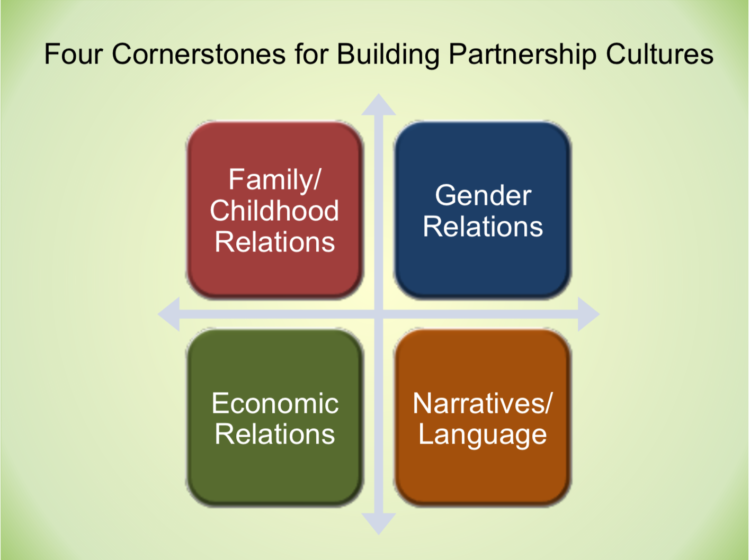

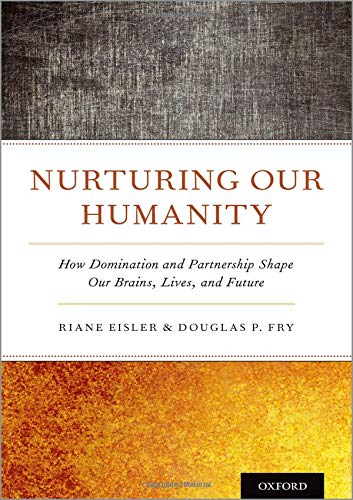
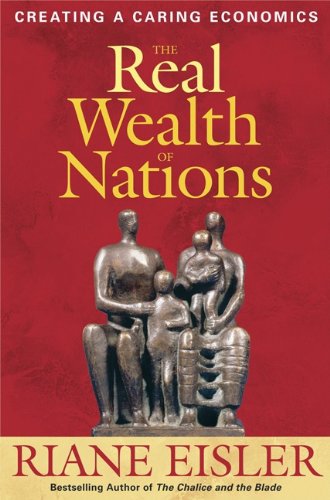
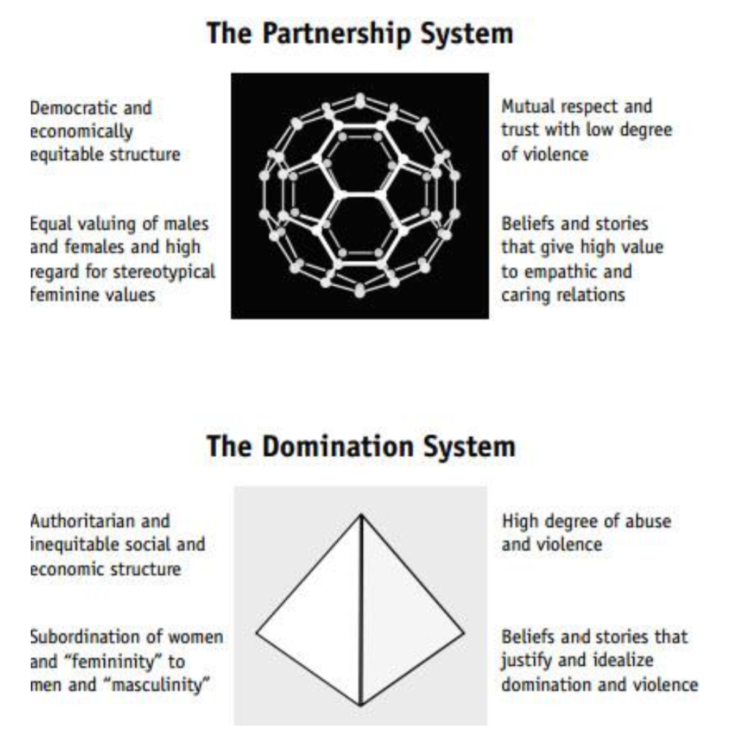
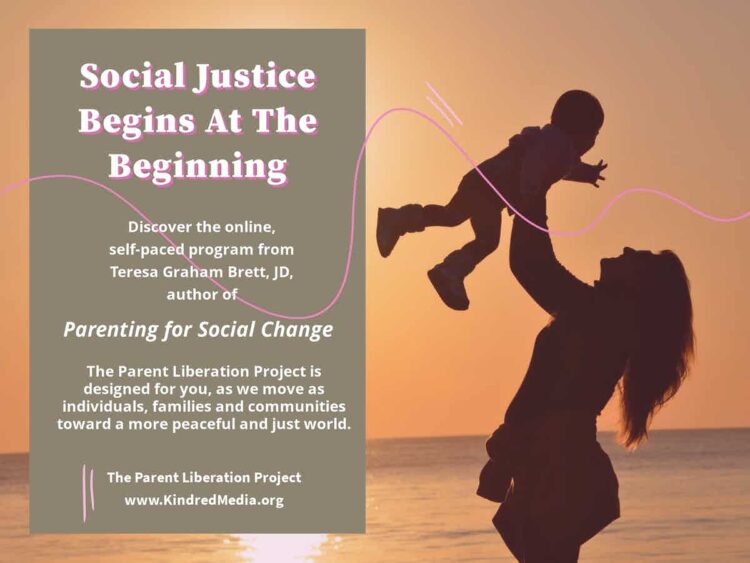
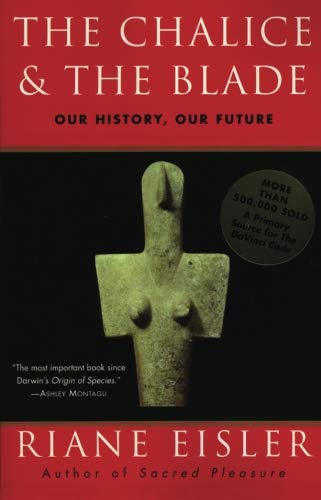
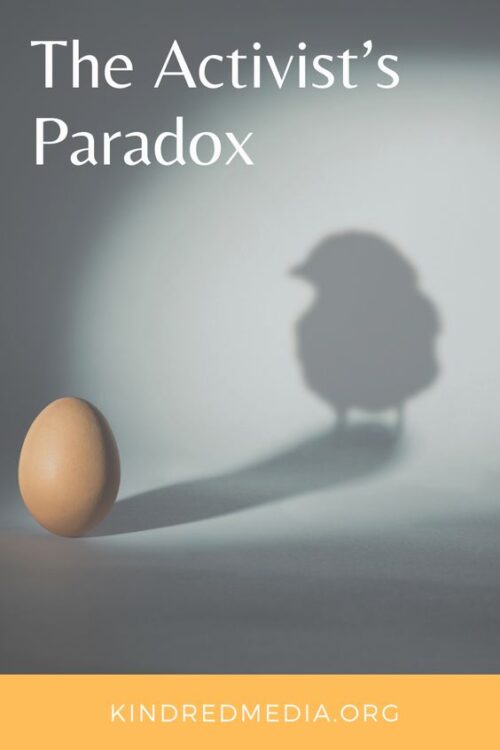
Comments are closed.